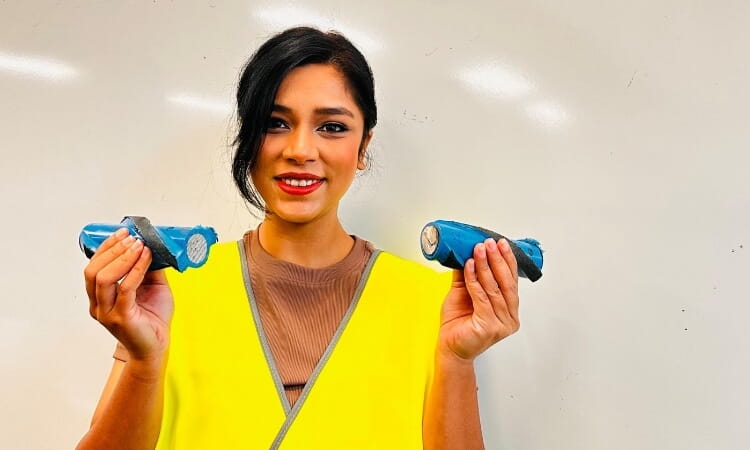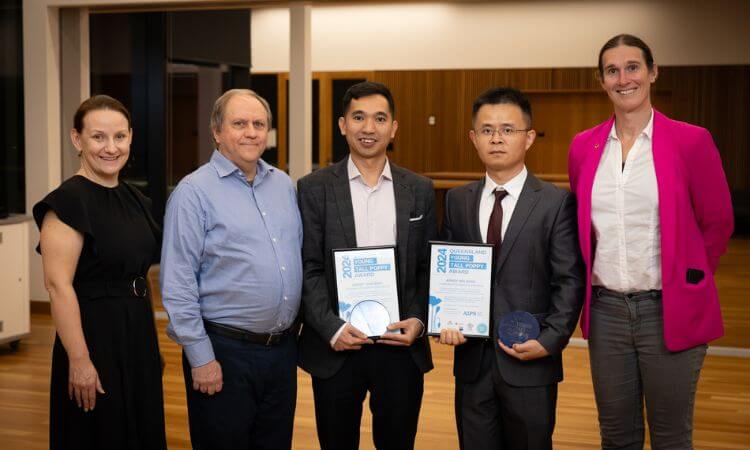A world-leading research centre in advanced composite materials and applications providing advanced partnerships with industry towards innovation and growth.
Centre for Future Materials is known for pioneering research and development in engineered fibre composites, prioritising industry lead R&D in advanced composite manufacturing, civil composites, smart materials, and geopolymer & concrete. It operates a dedicated industry test service for more than 1000 clients across multiple sectors both nationally and internationally.
Centre for Future Materials
Themes and Projects
High value composites manufacturing research works closely with Australian and international aerospace, defence and space industries. We have developed unique capabilities in repair, robotic filament winding, robotic braiding, pultrusion, AI applications in autoclave and out-of-autoclave. Besides polymeric composites, we also focus on the manufacturing of oxide-oxide prepreg ceramic composites.
Title: LP220100278 Fire-Retardant Composite Resins for Bushfire-Safe Wind Farm Infrastructures
Leader: Professor Pingan Song | Professor Xuesen Zeng
Project Partners: ACCIONA | Allnex Resins Australia
Funding Body: ARC Linkage
Environmentally friendly flame-retardant development and composite pultrusion process of key electric infrastructures on wind farms.
Title: CRCPXII000174 DART CMPAirframe: A composite reusable hypersonic platform
Leader: Professor Xuesen Zeng | Dr Tristan Shelley | Professor Peter Schubel
Project Team: Dr Cam Minh Tri Tien | Molly Hall
Project Partners: Hypersonix | LSM Advanced Composites | ROMAR
Funding Body: CRC Programme
Cost effective ceramic composite design and manufacturing for re-usable hypersonic satellite launch vehicles, with service temperature up to 900 degrees Celsius.
Title: iLAuNCH Manufacturing Twins for Composite Repair
Leader: Professor Xuesen Zeng | Dr Tristan Shelley | Professor Peter Schubel
Funding Body: Department of Education Trailblazer Universities Programme
Full integration framework of physical and digital composite structural maintenance and repairs, with advanced sensors and novel repair technologies.
This work focuses on developing functional composites and composites for special applications. The research investigates: in-situ structural health monitoring systems, nano material for high-efficiency energy conversion, and shape memory composites.
Title: Carbon fibre thermoplastics as next-generation carbon fibre composites.
Leader: Professor Hao Wang
Project Team: Dr Venkata Chevali | Professor Uday Vaidya
Project Partners: The University of Tennessee Knoxville
Funding Body: ARC
By combining sizing, chemical grafting, and nano-reinforcement strategies, this project develops chemically and thermally robust thermoplastic interfacial sizing for carbon fiber/thermoplastic composites for rapid manufacturing.
Title: Fire-Retardant Composite Resins for Bushfire-Safe Wind Farm Infrastructures.
Leader: Professor Pingan Song
Project Team: Professor Xuesen Zeng | Dr Zhenhu Cao | Dean Voice
Project Partners: Ningbo Miruo Electronic Technology Co., Ltd | Allnex Composites | Acciona Energy Oceania Pty Ltd
Funding Body: ARC
This project aims to develop advanced fire-retardant composite resins for manufacturing bushfire-safe wind farm infrastructures.
Title: Advanced Gas Diffusion Electrodes for Electrochemical Manufacturing. Leader: Associate Professor Lei Ge
Funding Body: ARC
This project aims to develop electrochemical conversion technologies to convert carbon dioxide into globally needed chemicals.
Title: Testing and Analysis of Pipeline Encapsulation Technologies
Leader: Professor Allan Manalo
Project Team: Prof. Karu Karunasena, Dr. Shanika Kiriella, Dr. Hamid Ahmadi, Dr. Cam Minh Tri Tien, Mr. Ahmad Salah
Project Partners: University of Colorado Boulder, Cornell University, Gas Technology Institute
Funding Body: Advanced Research Projects Agency-Energy (ARPA-E), US Department of Energy
This project is dedicated to establishing performance objectives and characterizing failure modes for internal replacement pipe (IRP) technologies. By utilizing advanced modelling, simulation, and testing methodologies, we aim to provide comprehensive recommendations for material properties that ensure acceptable design-life performance. Additionally, we developed an open-source application, named IRPAnalyzer, specifically designed for the analysis and design of IRP systems for pipeline rehabilitation. This tool will enhance the capabilities of industry practitioners in implementing effective IRP technologies. The link to the executable file for the standalone version of IRPAnalyzer can be found here: IRPAnalyzer Version 2.1
Title: Advanced composite reinforcing materials for longevity of Australian Infrastructure
Leader: Professor Allan Manalo
Project Team: Dr Omar Alajarmeh | Dr Hannah Seligmann | Neda Bozorgi | Hazem Shebl
Project Partners: Inconmat | Queensland Department of Transport and Main Roads | Holcim/Humes | Zero Waste Matters | Graphene Manufacturing Group
Funding Body: Cooperative Research Centre - Project (CRCPXIII000007)
This project supports the development of novel, sustainable and low-cost non-corrosive reinforcing solutions using recycled glass and plastics and advanced manufacturing to provide the Australian construction industry with a viable alternative to steel reinforcement products.
Title: Composite railway sleepers
Leader: Dr Wahid Ferdous
Project Team: Professor Allan Manalo
Project Partners: Austrak Pty Ltd | Partec Pty Ltd | Zero Waste Matters
Funding Body: Advance Queensland Industry Research Fellowship
The aim of this project is to develop a low cost, eco-friendly, and highly durable composite railway sleeper to replace traditional timber railway sleepers in Australia.
Title: Transformation of recycled waste resources into engineered materials and solutions for a circular economy (TREMS)
Leader: Professor Hao Wang | Weena Lokuge
Project Team: Dr Dhasindrakrishna Kitnasamy | Vimukthi Fernando
Project Partners: Paintback Limited | Tweed Shire Council | Halok Pty Ltd | Moreton Bay Regional Council
Funding Body: ARC Industrial Transformation Research Hub
With the support from the ARC and industry partners, UniSQ research team is developing new sustainable construction materials and solutions by considering the waste paint, soft plastics and glass as a resource.
Title: Sustainable Industry Manufacturing Planning for Long-term Ecosystems (SIMPLE) Hub – Development of Sustainable Amended Grout Products for Mining
Leader: Associate Professor Polly Burey | Dr Tristan Shelley
Project Team: Associate Professor Ali Mirzaghorbanali, Hadi Nourizadeh, Mr. Alireza
Project Partners: Jennmar Australia
Funding Body: Australian Government – Department of Education (formerly DESE)
To enhance the sustainability of cement industries, it is essential to use pozzolanic waste additions like fly ash, silica fumes, furnace slags, waste glass, as well as other waste materials such as plastics and agricultural wastes as fillers. The objective of this project is to introduce new and improved cementitious grouts by replacing parts of the clinker content of conventional grouts with supplementary waste materials.
Title: New Options for Saving Waste and the Environment (NO WASTE) Pilot Precinct – polyCUPboard Demonstrator
Leader: Associate Professor Polly Burey | Dr Tristan Shelley
Project Team: Dr Matthew Flynn
Project Partners: Talon Carbon Fibre R&D
Funding Body: Australian Government – Department of Education (formerly DESE)
Over 1 billion single-use coffee cups are used in Australia each year, but the plastic lining in the cups makes them nearly impossible to recycle with our current infrastructure. This project is developing polyCUPboard – a composite material which uses the plastic lining of the cups as a ‘glue’ to bind everything together, so it can be made entirely from recycled materials and prevent the cups from being sent to landfill.



